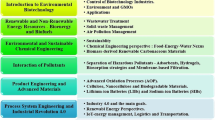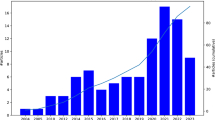Abstract
Service-oriented approach or a combination of Product-Service System (PSS) is often regarded as more promising to traditional discreet product selling. To have a sustainable product or service, PSS systems must equally satisfy the three stakeholders of sustainability viz. people, planet, and profit generated by the companies. However, this is often not the case as the other stakeholders often ignore interest of the planet, as a stakeholder. Government tax incentives could act as an enabler to mitigate this difference. In this work, we explore this issue by developing methodologies to optimize the needs of various stakeholders. We develop equations to express the three Ps of sustainability to find out appropriate government incentives as tax on people and product-manufacturing companies to make products and services more sustainable, assuming that the taxes collected are utilized in restoring the environment. We use Multi-Objective Genetic Algorithm to find the optimized taxes for some possible combinations of sale price and number of units to be manufactured. We take a case and explain the application of this novel methodology for a car manufacturing scenario.







Similar content being viewed by others
Abbreviations
- \(P\) :
-
Profit ($)
- \(I_{e}\) :
-
Environment impact
- \(I_{s}\) :
-
Social impact
- \(x_{1}\) :
-
Sale price per unit ($)
- \(x_{2}\) :
-
Number of units of car
- \(x_{3}\) :
-
Company taxes per unit ($)
- \(x_{4}\) :
-
People taxes per unit (including service tax and Value-Added Tax–VAT) ($)
- \(C_{F}\) :
-
Fixed cost per unit ($)
- \(C_{v}\) :
-
Variable cost unit ($)
- \(C_{t}\) :
-
Total cost unit ($)
- \(E_{{CO_{2} }}\) :
-
CO2 equivalent (kg)/d)
- \(C_{{Eco_{2} }}\) :
-
Cost of CO2 equivalent per kg ($)
- \(n\) :
-
Life of car in terms of number of days (d)
- \(\in_{si}\) :
-
Social interest
- \(t\) :
-
Duration of use per car per day (h)
- \(C\) :
-
Cost of use per hour per unit ($)
- \(C_{f}\) :
-
Fuel cost ($)
References
Baines TS, Lightfoot HW, Evans S et al (2007) State-of-the-art in product-service systems. Proc Inst Mech Eng Part B J Eng Manuf 221:1543–1552
Brandstotter M, Haberl M, Knoth R, et al. (2003) IT on demand-towards an environmental conscious service system for Vienna (AT). Environ. Conscious Des. Inverse Manuf. 2003 EcoDesign03 2003 3rd Int. Symp. On. IEEE, pp 799–802
Brundtland GH (1987) World Commission on environment and development: our common future. Oxford University Press, Oxford
Cernea MM (1985) Putting people first: sociological variables in rural development: Reprint. Oxford University Press, Oxford
Chang D-S, Yeh L-T, Liu W (2014) Incorporating the carbon footprint to measure industry context and energy consumption effect on environmental performance of business operations. Clean Technol Environ Policy 1–13
Chhipi-Shrestha GK, Hewage K, Sadiq R (2014) “Socializing” sustainability: a critical review on current development status of social life cycle impact assessment method. Clean Technol Environ Policy 1–18
Consultants Pr (2008) SimaPro software. SimaPro Version
Deb K (2001) Multi-objective optimization using evolutionary algorithms. John Wiley & Sons, Chichester
Deb K, Pratap A, Agarwal S, Meyarivan T (2002) A fast and elitist multiobjective genetic algorithm: NSGA-II. Evol Comput IEEE Trans On 6:182–197
Ehler CN (2003) Indicators to measure governance performance in integrated coastal management. Ocean Coast Manag 46:335–345
Elkington J (1994) Towards the suitable corporation: win-win-win business strategies for sustainable development. Calif Manag Rev 36:90–100
Elkington J (2013) Enter the triple bottom line. In: Henriques A, Richardson J (eds) The triple bottom line-does it all add up? Routledge
Fiksel J, Bruins R, Gatchett A et al (2014) The triple value model: a systems approach to sustainable solutions. Clean Technol Environ Policy 16:691–702
Goedkoop MJ (1999) Product service systems, ecological and economic basics. Ministry of housing, spatial planning and the environment, communications directorate
Gold MV (1994) Sustainable agriculture: definitions and terms. Spec. Ref. Briefs USA 94
Google (2012) Rent a car new york: google search. www.google.co.in/search?q=rent+a+car+new+york&ie=utf-8&oe=utf-8&aq=t&rls=org.mozilla:en-US:official&client=firefox-a. Accessed 10 Oct 2014
Hubbard G (2009) Measuring organizational performance: beyond the triple bottom line. Bus Strateg Environ 18:177–191
Krajnc D, Glavič P (2004) Indicators of sustainable production. Springer, Dordrecht
Majumdar D, Majhi BK, Dutta A, et al. (2014) Study on possible economic and environmental impacts of electric vehicle infrastructure in public road transport in Kolkata. Clean Technol Environ Policy 1–9
Manzini E, Vezzoli C, Clark G (2001) Product-service systems: using an existing concept as a new approach to sustainability. J Des Res 1:12–18
Maroušek J (2013) Study on agriculture decision-makers behavior on sustainable energy utilization. J Agric Environ Ethics 26:679–689
Maroušek J (2014) Economically oriented process optimization in waste management. Environ Sci Pollut Res 1–3
Maroušek J, Hašková S, Zeman R, et al. (2014a) Assessing the implications of EU subsidy policy on renewable energy in Czech Republic. Clean Technol Environ Policy 1–6
Maroušek J, Hašková S, Zeman R, Vaníčková R (2014b) Managerial preferences in relation to financial indicators regarding the mitigation of global change. Sci Eng Ethics 1–5
Mont O (2000) Product-service systems. Final Report. IIIEE Lund University
Mont OK (2002) Clarifying the concept of product–service system. J Clean Prod 10:237–245
Mont O (2008) Product-service systems: panacea or myth? VDM Verlag
Petri I, Rezgui Y, Beach T, et al. (2014) A semantic service-oriented platform for energy efficient buildings. Clean Technol Environ Policy 1–14
Pezzey J (1992) Sustainability: an interdisciplinary guide. Environ Values 321–362
Statistics I (2011) CO2 emissions from fuel combustion-highlights. In: IEA Paris. www.iea.org/publications/freepublications/publication/co2-emissions-from-fuel-combustion-highlights-2013-.html?direct=1. Accessed 10 Sep 2013
Vinodh S, Jayakrishna K, Kumar V, Dutta R (2014) Development of decision support system for sustainability evaluation: a case study. Clean Technol Environ Policy 16:163–174
Author information
Authors and Affiliations
Corresponding author
Appendix
Appendix
Multi-objective function coding in MATLAB

MATLAB code to execute ‘gamultiobj’ command

Rights and permissions
About this article
Cite this article
Gupta, S., Sarkar, P. & Singla, E. Understanding different stakeholders of sustainable product and service-based systems using genetic algorithm. Clean Techn Environ Policy 17, 1523–1533 (2015). https://doi.org/10.1007/s10098-014-0880-y
Received:
Accepted:
Published:
Issue Date:
DOI: https://doi.org/10.1007/s10098-014-0880-y




